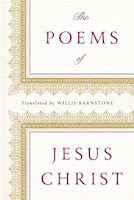This is one that popped up in one of those "others who bought this book also bought..." links. Usually I ignore those lists completely but the title of this one intrigued me.
The author's base concept is I think sound. Barnstone suggests that Jesus of Nazareth, like many great oral teachers, used poetic speech forms to help his words "stick" but that in the progression of translation (from spoken Aramaic to the Greek of the written Gospels on through the plurality of translations available today) the poetic nature of these teachings has been lost. I agree. I think that is a valid supposition. Of course it is also unprovable and un-disprovable. Barnstone then claims that this volume will return the poetic form to the words [commonly assigned to] of Jesus.
But In the end I am not sure it succeeds. Poetry is based on the rhythm and conventions of its home language. Poetry is very hard to translate and maintain the effect. And just putting the English translations into lines doesn't quite do it. Sometimes it works but other times, well not so much. Still it will be a handy volume to have on hand for when I want a different translation or impression of a passage. {Barnstone also include the Gospel of Thomas}

I would be interested if there were any Aramaic poems in the literature from that period. Else how would you know how poetry was expressed?? Since singing is a big part of worship, a singing Jesus is just as plausible.. Just wondering, maybe a wandring minstrel be, not to make light of a serious subject.
ReplyDelete